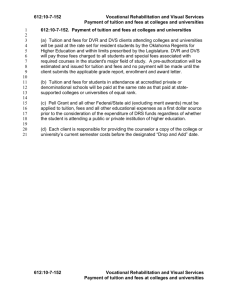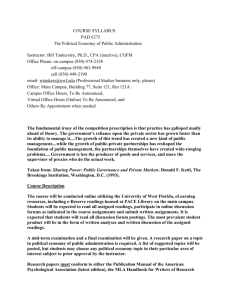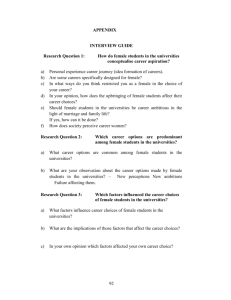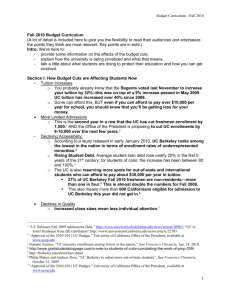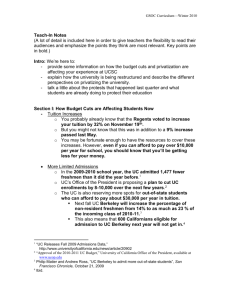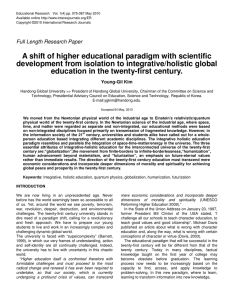We believe that education is an important part of the public sector
advertisement
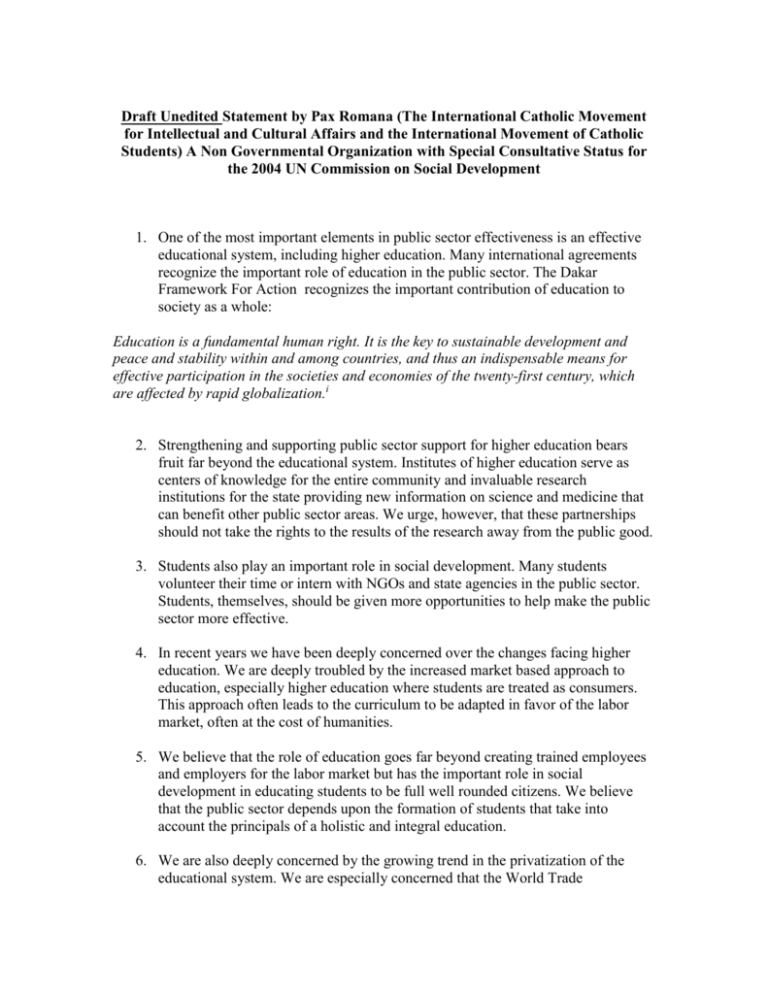
Draft Unedited Statement by Pax Romana (The International Catholic Movement for Intellectual and Cultural Affairs and the International Movement of Catholic Students) A Non Governmental Organization with Special Consultative Status for the 2004 UN Commission on Social Development 1. One of the most important elements in public sector effectiveness is an effective educational system, including higher education. Many international agreements recognize the important role of education in the public sector. The Dakar Framework For Action recognizes the important contribution of education to society as a whole: Education is a fundamental human right. It is the key to sustainable development and peace and stability within and among countries, and thus an indispensable means for effective participation in the societies and economies of the twenty-first century, which are affected by rapid globalization.i 2. Strengthening and supporting public sector support for higher education bears fruit far beyond the educational system. Institutes of higher education serve as centers of knowledge for the entire community and invaluable research institutions for the state providing new information on science and medicine that can benefit other public sector areas. We urge, however, that these partnerships should not take the rights to the results of the research away from the public good. 3. Students also play an important role in social development. Many students volunteer their time or intern with NGOs and state agencies in the public sector. Students, themselves, should be given more opportunities to help make the public sector more effective. 4. In recent years we have been deeply concerned over the changes facing higher education. We are deeply troubled by the increased market based approach to education, especially higher education where students are treated as consumers. This approach often leads to the curriculum to be adapted in favor of the labor market, often at the cost of humanities. 5. We believe that the role of education goes far beyond creating trained employees and employers for the labor market but has the important role in social development in educating students to be full well rounded citizens. We believe that the public sector depends upon the formation of students that take into account the principals of a holistic and integral education. 6. We are also deeply concerned by the growing trend in the privatization of the educational system. We are especially concerned that the World Trade Organization has listed Education as one of the 12 tradable service sectors. We affirm the Joint Declaration on Higher Education and the General Agreement on Trade in Services by a number of university associations that asserts that: “Higher education exists to serve the public interest and is not a “commodity”, a fact which WTO Member States have recognized through UNESCO and other international or multilateral bodies, conventions, and declarations . The mission of higher education is to contribute to the sustainable development and improvement of society as a whole by: educating highly qualified graduates able to meet the needs of all sectors of human activity.ii 7. We believe that education cannot be treated or seen as a mere product to be bought and sold on the open market. In addition to negative impacts on the curriculum, privatization also risks violating the rights of people to higher education which is guaranteed in Article 26 of the Universal Declaration of Human Rights on the basis of merit and not economic status. 8. The privatization of educational institutions raises the cost of education to a level that many students cannot afford. In recent years we have seen powerful examples of students reacting strongly to increasing tuition at public universities. Most notably in 2000, thousands of students at the National Autonomous University of Mexico (UNAM) held a nine month sit-in shutting down the university, hurting an important part of Mexico’s public sector. Similar strikes and protests against tuition increases and the privatization of universities have taken place in many other parts of the world. 9. The privatization of universities and the increase of tuition without broad scholarship programs often denies students their human right to access to higher education. With more than one billion people living on less than 1 dollar a day, even minimal tuition denies access to education for many. Because of the rising cost of education, many students in all parts of the world are forced to work while taking courses part time. As a result many students take up to ten years to complete their higher education program, delaying the time when they can actively participate in society with a degree. 10. We recognize that many state sponsored institutions may not provide the best quality of education when compared to private universities. The solution for this should not be to give up on the state sponsored institutions in favor of private universities, but it should be to find ways to make public institutions of higher education more effective. 11. We support the principals agreed upon in the 1998 UNESCO World Declaration on Higher Education for the Twenty-First Century: Vision and Action that highlights the important role of the state in making pubic education more effective: The funding of higher education requires both public and private resources. The role of the state remains essential in this regard. (a) The diversification of funding sources reflects the support that society provides to higher education and must be further strengthened to ensure the development of higher education, increase its efficiency and maintain its quality and relevance. Public support for higher education and research remains essential to ensure a balanced achievement of educational and social missions. (b) Society as a whole must support education at all levels, including higher education, given its role in promoting sustainable economic, social and cultural development. Mobilization for this purpose depends on public awareness and involvement of the public and private sectors of the economy, parliaments, the media, governmental and nongovernmental organizations, students as well as institutions, families and all the social actors involved with higher educationiii 12. We understand the need for partnerships between the public and private sector when it comes to higher education but we strongly believe that these partnerships should not reduce or limit the important role of public educational institutions in providing education to students and in doing research on behalf of the entire society. 13. We believe that private institutions of higher education are also important for the society but they should not be seen as the solution to overcoming the lack of resources of the state to funded public institutions. Unfortunately, private institutions are too expensive for many people. As quality education should not be limited to those who can afford it, private universities should work with the public institutions to help ensure all member society have access to higher education. 14. To help make public education, especially higher education, more effective we encourage the Commission and its members to: keep in mind the importance of education, particularly higher education, as part of the public sector, promote and protect the human rights of students to have access to higher education based on merit and not the ability to pay, honor the international agreements made on education, especially the Dakar Framework For Action and the UNESCO World Declaration on Higher Education for the Twenty-First Century: Vision and Action, to approach privatization of any public service cautiously and with the consultation of NGOs, encourage responsible and creative partnerships between public sector educational institutions and the private sector that do not limit the quality of education and research, help raise public awareness of the importance of sate funding and support for education, including higher education, i ii find creative ways to support public universities in developing countries that maintains the quality of the education. The World Education Forum Dakar, Senegal, 26-28 April 2000, #6 Association of Universities and Colleges of Canada, American Council on Education, European University Association (EUA), and the Council for Higher Education Accreditation (CHEA), Joint Declaration on Higher Education and the General Agreement on Trade in Services. 28 September 2001. iii UNESCO World Declaration on Higher Education for the Twenty-First Century: Vision and Action, 1998. Article 14.



